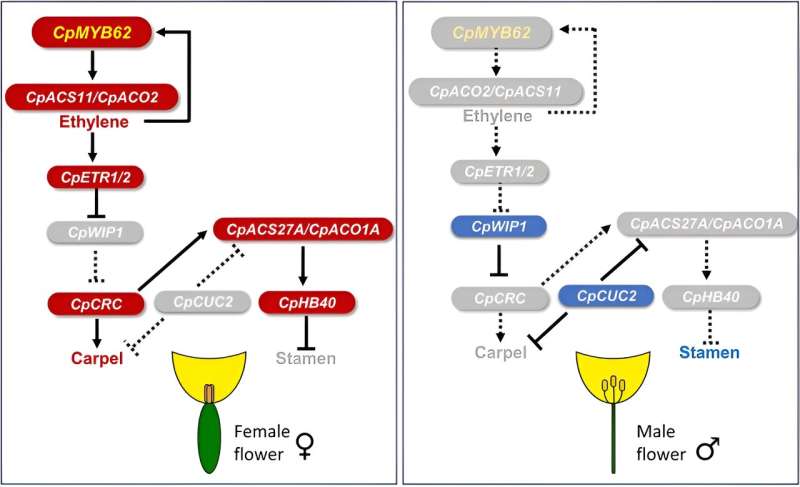Gene network controlling the specification and development of female and male flowers in cucurbits. Credit: Horticulture Research (2024). DOI: 10.1093/hr/uhae115
Sex determination in cucurbits such as squash is influenced by a complex interplay of environmental, hormonal, and genetic factors, with ethylene being the primary hormone promoting female flower development.
Despite understanding ethylene's role, the upstream regulators controlling its production remained elusive. The conversion of female flowers to male flowers in certain mutants highlighted gaps in knowledge regarding genetic influences.
Based on these challenges, an in-depth study was essential to uncover the genetic mechanisms regulating sex determination and improve crop yields through targeted genetic manipulation.
Researchers from the University of Almería published a study in Horticulture Research that focuses on the transcription factor CpMYB62 and its essential role in female flower development in Cucurbita pepo.
Through the identification and characterization of the myb62 mutation, the researchers discovered that CpMYB62 regulates ethylene production, which is crucial for female flower formation. The study provides valuable insights into the genetic mechanisms governing sex determination in squash, offering potential strategies for enhancing crop yields.
The study identified the myb62 mutation in ethylmethane sulfonate (EMS) mutant lines, which converted all female flowers into male flowers. Using Bulk Segregant Analysis Sequencing (BSA-seq) and Whole Genome Sequencing (WGS), researchers discovered that the myb62 mutation is a C>T transition in the CpMYB62 gene, causing a premature stop codon and a truncated transcription factor.
This mutation leads to reduced ethylene production, crucial for female flower development. Exogenous ethylene application partially rescued the female flowering phenotype, confirming CpMYB62's role in ethylene regulation. Transcriptomic analysis revealed that CpMYB62 regulates key sex-determining genes, upregulating those involved in carpel development (CpACO2B, CpACS27A) and downregulating those arresting carpel development (CpWIP1).
CpMYB62 thus occupies a pivotal position in the gene network controlling sex determination in Cucurbita pepo, promoting female flower development by activating ethylene biosynthesis and other sex-determining genes.
Dr. Cecilia Martínez, one of the senior researchers, stated, "This discovery sheds light on the genetic mechanisms controlling female flower development in squash. Understanding the role of CpMYB62 in regulating ethylene production opens new avenues for improving crop yield by manipulating flower development genetically."
The findings of this study have significant implications for agricultural practices. By manipulating the CpMYB62 gene, it may be possible to enhance female flower production, thereby increasing fruit yield in squash and other cucurbits.
This research not only advances our understanding of plant genetics but also offers practical solutions for improving crop productivity in the horticulture industry.
More information: María Segura et al, The transcription factor CpMYB62 controls the genetic network that leads to the determination of female flowers in Cucurbita pepo, Horticulture Research (2024). DOI: 10.1093/hr/uhae115
Journal information: Horticulture Research
Provided by University of Almería
























